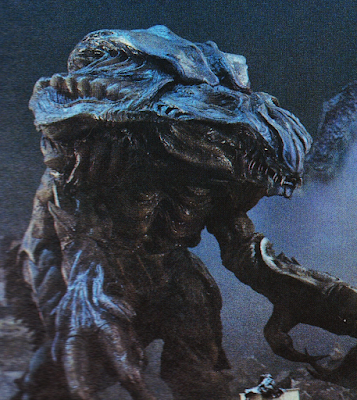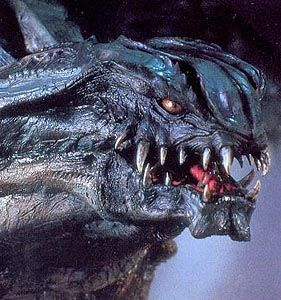Fathom Events returns Godzilla 2000: Millennium to theaters on Nov 1 to commemorate Godzilla Day 2023.
Toho's 1999 reboot, directed by Takao (Godzilla vs Mechagodzilla II) Okawara (interestingly enough, a self-professed, non-Godzilla fan) and written by Hiroshi Kashiwabara and Watara (Godzilla vs Mechagodzilla II) Mimura, was a reply to (and contrasting companion piece for) Roland Emmerich and Dean Devlin's polarizing, Godzilla 1998.
While the Emmerich/Devlin production retold the Godzilla origin from a different, biological vantage, Godzilla 2000 resumed the basics, pitting the world's radioactive, cell-regenerating "savior" against a new behemoth, an entity constructed from many data-draining extraterrestrials. To achieve their collective simulation, these unseen entities simulate Godzilla's dynamic DNA while in their sixty-million-year-old space-saucer, which rests atop the Tokyo City Opera Tower.
The resulting, grayish monstrosity flaunts bulky, bear-ish traits, which appear inspired by those of H.G. Wells' The War of the Worlds invaders. (At the creature's outset, it passes for a cross between a Wells' Martian War Machine and Toho's Space Amoeba, and then later, if one is so inclined to bend one's mind, a Lovecraftian redesign of Return of the Jedi's Rancor.) Otherwise, this "Millennian" monster, named Orga (Oruga in the Japanese edition), operates as a super-deformed, bipedal whale, which from sideview shots, invokes Gamera-like shelling.
The story's strong, sci-fi slant grants it an air of X-Files modernism, though for the most part, it sticks to tested paradigms, recalling (to a fair degree) Godzilla vs Biollante, as it weaves alien-espionage tropes of the 1970s Mechagodzilla chapters with such 1960s forerunners as Ghidrah, the Three Headed Monster (Three Giant Monsters: The Greatest Battle on Earth), Monster Zero (Invasion of Astro-Monster) and Destroy All Monsters (Godzilla: Destroy All Monsters Melee).
The prime, human characters, perhaps due to their throwback designations, are identifiable and for the most part, forthright, consisting of Takehiro Murata's Professor Yuji Shinoda; Mayu Suzuki's tech-savvy Io (Shinoda's daughter); Naomi Nishda as their loyal colleague, Yuki Ichinose; Shiro Sana as their other loyal (though guilt-ridden) colleague, Shiro Miyasaka; and Hiroshi Abe as Mitsuo Katagiri, the ambitious-to-a-fault head of GPN (Godzilla Prediction Network), to which Shinoda was once linked, though now uses his renegade, kaiju-tracking techniques in the name of unfettered, public safety.
Both Tsutomu Kitagawa, as Godzilla, and Makato Ito, as Orga, do a resplendent job conveying fluidity through their cumbersome costumes, in particular when the titans clash, and the big bout is worth the wait, delivering A-one, to-the-death provocations, with a penultimate poignancy that exceeds Son of Godzilla and Godzilla vs Destoroyah.














No comments:
Post a Comment